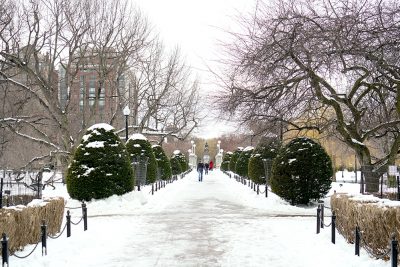
SERENA YU/ DAILY FREE PRESS STAFF
Boston Mayor Martin Walsh announced plans Jan. 17 to allocate $28 million for improvements to the Boston Common, the oldest park in the United States.
The funds for the project were generated by the recent sale of the Winthrop Square Garage in Boston’s Financial District, a space which will be turned into a building.
Liz Vizza, executive director of the Friends of the Public Garden — an advocacy group that cares for the Common — said in addition to the $28 million that has been directed toward improvements for the Common, Franklin Park will also be granted $28 million.
Additional money from the sale of the garage will also be allocated for public housing projects, Vizza said.
“If this money is coming to the park, we need to do a master plan so that the money can be thoughtfully and comprehensively used for the best future of the Common, and it needs to be a robust public process,” Vizza said.
Though the Winthrop Square Garage lot has been sold, Vizza said she is concerned about the impact the new building would have on the surrounding greenery.
“We opposed it because we didn’t want to have the threat and the impact of shadows on the turf and the trees,” Vizza said.
There are two state laws that were put into place in the 1990s to maintain a balance between the development and protection of open spaces, Vizza said.
She explained one law protects the Common from excessive shadows created by surrounding buildings and the other protects the Boston Public Garden.
“For decades since those laws were put in place there’s been a thoughtful balance between development and preservation of sunlight in the park to be able to have healthy turf and trees,” Vizza said.
These laws were amended in order to allow for the sale of the Winthrop Square Garage in July 2017, but she said the effects of this sale on the Common is her worry because she is concerned it might set a bad example for the future.
“It sets a precedent for future mayors and future developers to say, ‘OK, they amended the shadow laws in 2017, we can amend that again because we have a really good project, and it’s going to reap really good benefits for the city, it’s just a little more shadow,’” Vizza said.
Ryan Woods, the deputy commissioner of Boston Parks and Recreation, said many things need improvement and refurbishment in the Common — in particular, power upgrades.
“In order to freeze the Frog Pond every year, we are renting a chiller because the infrastructure under the Frog Pond does not work,” Woods said. “You can see when they string Christmas lights every year the cords going from tree to tree, so there definitely needs to be electrical upgrades.”
Lon Chaifetz, 66, of Back Bay, said he thinks there should be aesthetic improvements made to the Common.
“It always seems kind of plain and shabby compared to the Public Garden,” Chaifetz said. “Not that I expect swan boats or as many blooming flowers and prettiness, but it could definitely be fixed up, that’s for sure.”
David Timmons, an associate professor of economics at UMass Boston, said he thinks the lackluster appearance of the Common is likely due to heavy use and tourism, not a lack of maintenance.
“Too many people using a green area can definitely cause damage, whether those people are local or tourists,” Timmons said. “For example, excessive foot traffic can kill grass and compact soil around tree roots.”
Anastasia Hatcher, 31, of the South End, said she thinks the $28 million from the sale of the Winthrop Square Garage will lead to gentrification.
“That’s what’s happening all over,” Hatcher said. “Empty lots — not even empty lots — businesses being forced out for high rents, residents being forced out for high rents.”
Hatcher said that although the Common could stand to be improved, she thinks $28 million is too much to be allocating when there are other potential places to benefit from the money, such as homeless shelters, the public school system or more affordable housing.
“I don’t think it’s $28 million worth,” Hatcher said. “I don’t think all the money should go towards that.”
Mel Mackin, 25, of Jamaica Plain, said she supports the improvements to the Common.
“While the cosmetic and aesthetic appearance of the Common doesn’t seem like a priority or a priority on the scale of $28 million,” Mackin said, “I understand why that park is being redone to preserve it.”





















































































































Anne Contini • Jan 24, 2019 at 3:51 pm
That’s a picture of the Public Garden; not the Boston Common.